|
Summary: A solar coronal mass
ejection (CME) swept past Earth at approximately 0315 UT on Oct.
28th and triggered a G2-category geomagnetic storm. The
CME (movie) left the Sun on Oct.
25th around 1500 UT when twisted magnetic fields above sunspot
9672 erupted. The explosion also sparked an X1-class solar
flare.
Editor's
Note:
One year ago a similar geomagnetic storm erupted. See the Oct. 28, 2000, Aurora Gallery
for details.
Unless
otherwise stated, all images are copyrighted by the photographers.
|
|
Photographer, Location |
Images |
Comments |
 |
Dennis
Mammana, Mt. Laguna, 50 miles east of San Diego, CA
Oct. 28 |
#1,
#2, #3,
more |
These photos by Dennis Mammana are extraordinary
not only for their beauty but also for their latitude -- Northern
Lights in southern California! |
 |
Paul Wicklund,
Spokane, Washington, USA
Oct. 28 |
#1,
#2, #3,
#4, more |
P. Wicklund: "We waited all day for the
rain to end; finally at 2 am the clouds began to break and the
auroras began. I have seen many auroras but these had the most
intense reds. Yellow streaks were visible to the eye at an intensity
I had seen before only in photos." Details: Minolta X 700,
28 mm lens, F2.8, Kodak Royal Gold 400, 20 sec. |
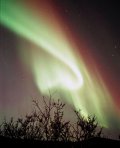 |
John Russell,
Nome, Alaska, USA
Oct. 28 |
#1,
#2, #3,
more |
Photo details: Nikkor 28mm @ f1.4, 8 to 13 seconds
on Fuji NHG 800. |
 |
Carol Lakomiak,
Tomahawk, Wisconsin, USA
Oct. 28 |
#1,
#2, #3,
#4, #5,
#6 |
C. Lakomiak: "The coronal activity was by
far the best I've ever seen. It climaxed in a visual crimson,
which flowed like the burning wings of a Phoenix. Quite a stunning
display!" |
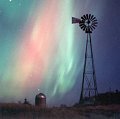 |
Lyndon Anderson,
15 miles north of Bismarck, North Dakota, USA
Oct. 28 |
#1,
#2, #3,
#4, #5,
#6, #7,
#8, more |
L. Anderson: "This was a beautiful display
- it didn't extend to the south like the March
30-31, 2001 event, but it had significantly more activity.
Photos were taken between midnight and 5:45 a.m." |
 |
Stan Richard,
Saylorville Lake, near Des Moines, Iowa, USA
Oct. 28 |
#1,
#2, #3,
#4, #5,
#6, #7,
more |
S. Richard: "The near-full moon really brought
out the colors, my first time shooting aurora under these conditions."
Photo details: 20mm lens @ f/2.5, 15-30 sec exposures on Fuji
NPZ 800 Professional. |
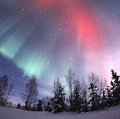 |
Wayne Johnson,
the Hatcher Pass area of Alaska, USA
Oct. 28 |
#1,
#2, #3,
#4 |
W. Johnson: "The auroras started at 7:30pm
local time, and I was able to photograph them until after 5 o'clock
the next morning. Chasing auroras [around here] can be challenging,
but when you have a night like this, boy is it worth it!" |
 |
Garth Arsenault,
Prince Edward Island, Canada
Oct. 28 |
#1,
#2, #3,
#4, #5,
#6, more |
G. Arsenault: "I was awestruck at the intensity
and colors of the sky from my living room window. I spent three
hours outside enjoying the sites, listening to the coyotes and
shooting two rolls of Kodak Max 400 ASA film. Exposures ranged
from 30-60 seconds with my Canon AV-1 camera." |
 |
Chris VenHaus,
Waukesha, Wisconsin, USA
Oct. 28 |
#1,
#2, #3,
more |
C. Ven Haus: "Photo
#2 was an interesting shot, in that the landscape was lit
by the Moon, and created an unusual color-cast to the background
sky." Photo details: Canon A2E, Canon 35mm f2.0, and Fuji
Superia |
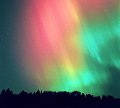 |
Suzanne Ruby,
Elk, Washington, USA
Oct. 28 |
#1, #2, #3,
#4 |
S. Ruby: "The Oct 28th show was a present
for my birthday. I have trouble seeing reds in the aurora but
not this night. At one point it was a solid red from east to
west. It took my breath away. Now if I could just get the aurora
to come earlier than 2:45 am!" Photo details: Pentex 1000
ASA 400 f - 2.8 average exposure time 12 sec. |
 |
Dominic
Cantin, near Quebec City, Quebec,
Canada
Oct. 28 |
#1,
#2, #3,
#4, #5,
more |
D. Cantin: "This was the best display that
I never saw - by far." Photo details: 28 mm @ f 2.8 , 25
seconds , Kodak supra 400. |
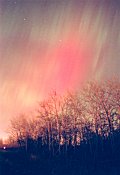 |
Jody
Majko, Winnipeg, Manitoba,
Canada
Oct. 28 |
#1, #2, #3,
#4, #5,
#6, #7 |
J. Majko: "I was out until 4:30 am viewing
the most spectacular auroral display I've ever seen. Earlier
in the evening it didn't look promising because the moon was
so bright. But when she sank below the horizon, the sky literally
exploded in these massive curtains of red, green and white! They
were so bright, It seemed like daytime! These shots were taken
in the middle of Winnipeg, and the light pollution didn't even
matter. What a fantastic night!" |
 |
John Carlson,
near Hutchinson, Minnesota, USA
Oct. 28 |
#1,
#2, #3,
#4, #5 |
J. Carlson: "After an hour of watching,
we took a few pictures over the
lake and headed towards home. We thought the show had fizzled
out. 10 minutes later the sky lit up. We turned around. Wow,
what a show! Next time we will be more patient." Photo details:
Konica T3 Camera with a Vivitar 24mm f/2 lens, Kodak Supra 800
Film, 15 to 60 sec. |
 |
Robert
Smith, near Stoneville, NC, USA
Oct. 28 |
#1, #2 |
R. Smith: "[I captured these images] on
Sunday morning, October 28th between 4 and 5 AM (EST). Compared
to the previous weekend, the wind chill felt like an arctic zone!"
Photo details: Lens 28mm f 2.8. Film: Fujicolor 400. |
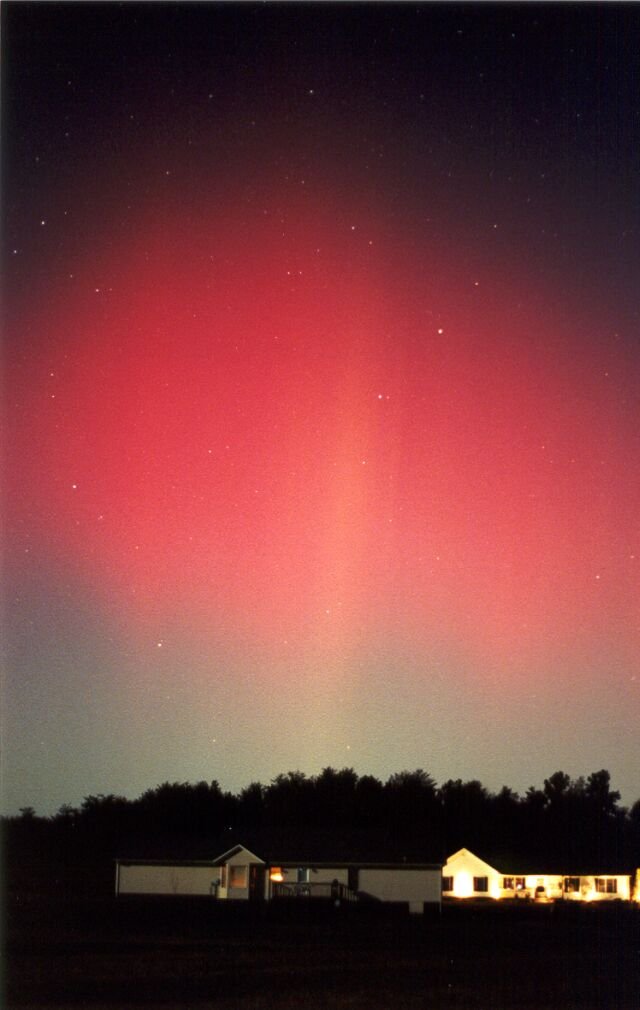 |
Ronnie
Sherrill, Troutman, NC, USA (lat. 36N)
Oct. 28 |
#1,
#2, #3,
#4, #5,
#6 |
R. Sherrill, Piedmont Amateur Astronomers: "This
was the second weekend in a row that I was able to view aurora
from my latitude. Maybe the Sun will calm down now and I can
get some sleep!" |
 |
Jean-Michel
Paillé, Poitiers, France
Oct. 28 |
#1,
#2, #3 |
J-M Paille: "Je vous envoie 3 photographies
que j'ai prises de l'aurore polaire observée dans l'Ouest
de la FRANCE le 28 octobre 2001. Il s'agit dans notre région
d'un phénomène exceptionnel." |
 |
Robert Falk,
near Granite Falls, Washington, USA
Oct. 28 |
#1, #2 |
Photo details: 28mm, f2.5, 10-20 sec, Fujicolor
Superia 800 film. |
 |
Sherry Buttnor,
Metchosin (near Victoria), British Columbia, Canada
Oct. 28 |
#1,
#2, #3,
#4, #5,
#6 |
S. Buttnor: "I have never seen such deep
red color in an auroral display! None of these photos have been
altered in any way." Photo details: Nikon FE camera, Tamron
28mm f/2.5 lens, Kodak Max 400 film with exposures of 15 to 20
seconds. |
 |
Jesús
Ojeda, St. Francis, Wisconsin, USA
Oct. 28 |
#1, #2, #3,
#4, #5,
#6, more |
J. Ojeda: "Once again we enjoyed a very
nice display here in Wisconsin. The sky started to glow around
0600 UT and kept glowing all night long." Photo details:
Nikon N80 camera, 28mm lens, f-stop 3.5, Fuji Superia 800 film,
20-30 sec. exposures. |
 |
Philippe
Moussette, Cap-Rouge Québec, Canada
Oct. 28 |
#1,
#2, #3,
#4, #5,
#6 |
Photo details: Coolpix 995 Digital Camera |
See
also our Oct 21-23, 2001, aurora gallery!
back
to spaceweather.com |



















